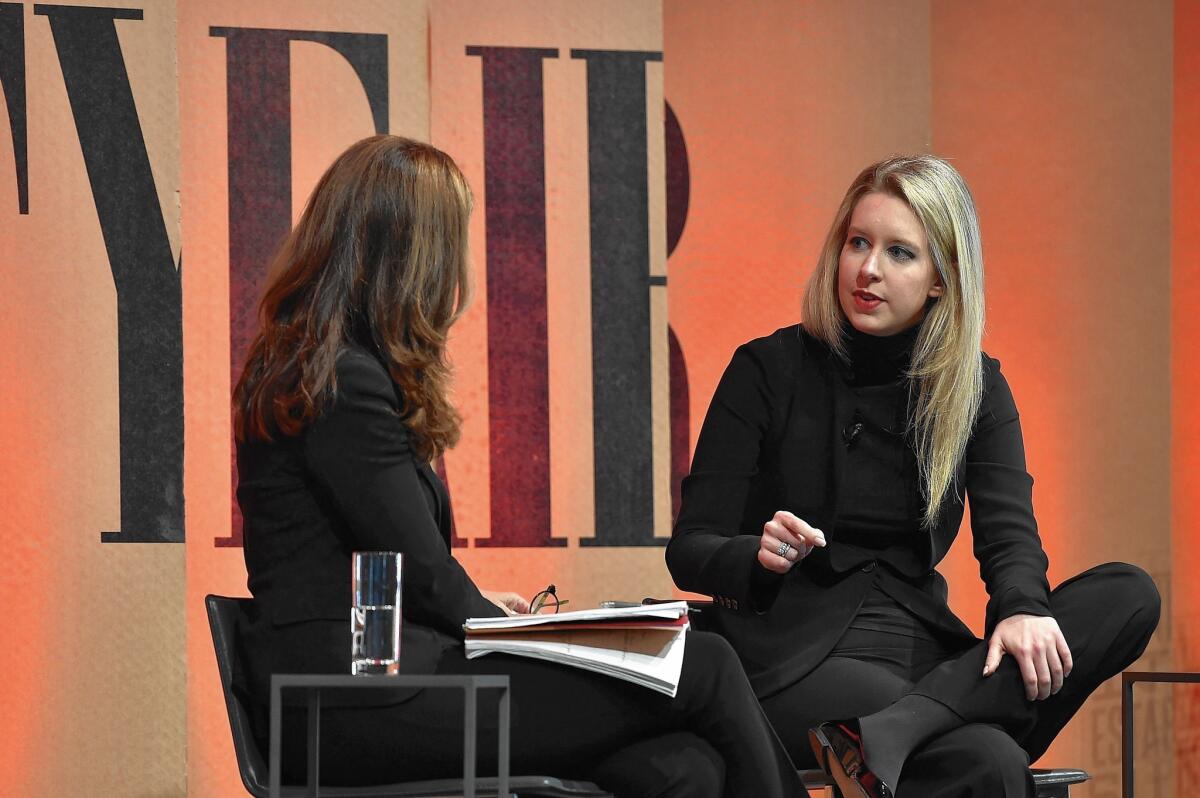Federal health regulators seek to revoke license of Theranos blood-testing lab

Elizabeth Holmes, right, founder and chief executive of blood-testing firm Theranos Inc., with NBC News’ Maria Shriver at a Vanity Fair event in October.
- Share via
Health regulators have proposed revoking the federal license for Theranos Inc.’s California laboratory and banning the firm’s top two executives from the blood-testing business for at least two years.
The proposed sanctions were included in a March 18 letter to the Palo Alto company from the federal Centers for Medicare and Medicaid Services, which found Theranos out of compliance with certain federal lab requirements.
Theranos’ founder and chief executive is Elizabeth Holmes and its president is Sunny Balwani.
Theranos has responded to the letter and is waiting for the agency to finish reviewing the privately held company’s proposed solutions, Theranos spokeswoman Brooke Buchanan said.
In the meantime, “CMS has not imposed any sanctions on Theranos or its executives,” and the sanctions proposed by the agency in its letter were “the worst-case scenario,” Buchanan said.
The Centers for Medicare and Medicaid Services declined to comment, noting that the letter was not intended to be made public. It was disclosed Wednesday by the Wall Street Journal.
Holmes, 32, started the company in 2003 to revolutionize the blood-testing business with technology that makes blood drawing easier for patients and at costs below commercial-lab prices.
Many of its tests require only droplets of blood from finger pricks, as opposed to obtaining a vial of blood, and use Theranos’ proprietary testing technology. The tests cover dozens of medical conditions.
The company says it has performed more than 6 million tests overall, and in 2014 Theranos was valued at about $9 billion after a funding round from investors.
Holmes, known for wearing a black turtleneck, became the world’s youngest self-made billionaire with a net worth of $3.6 billion, according to Forbes.
But Theranos’ business has been under increasing regulatory scrutiny in the last 12 months amid growing questions about the reliability and accuracy of its tests, which are crucial to how doctors then treat the affected patients.
“We do not believe patients were affected by the recent [CMS] audit and concerns that CMS has brought up with us,” Buchanan said.
The Centers for Medicare and Medicaid Services proposal to revoke Theranos’ license applies to the company’s lab in Newark, Calif., which handles about 10% of Theranos’ tests, Buchanan said.
The other 90% are handled by the firm’s lab in Phoenix, which employs most of the nearly 1,000 Theranos workers, she said.
But the proposed sanctions against Holmes and Balwani, if eventually imposed, would bar them from running any laboratory.
Theranos had responded to some of the Centers for Medicare and Medicaid Services concerns, saying last month, “We’ve made mistakes in the past in the Newark, Calif., lab, but when the company was made aware of the deficiencies we have dedicated every resource to remedy those failures.”
“We will continue to work with CMS to ensure every issue has been fixed completely,” the firm said.
Twitter: @PeltzLATimes
More to Read
Inside the business of entertainment
The Wide Shot brings you news, analysis and insights on everything from streaming wars to production — and what it all means for the future.
You may occasionally receive promotional content from the Los Angeles Times.











